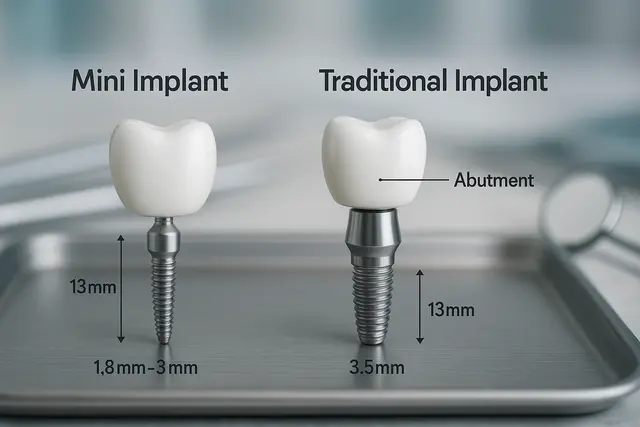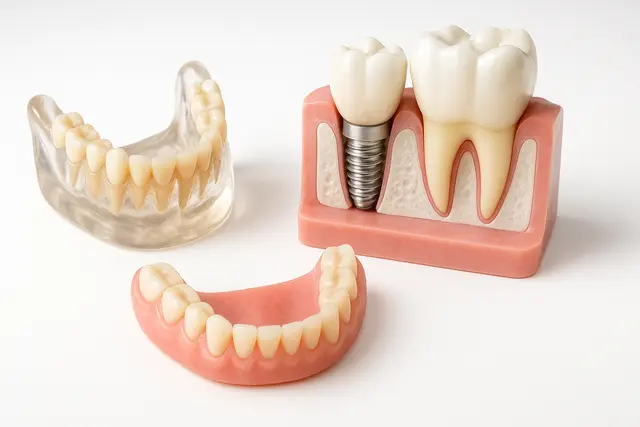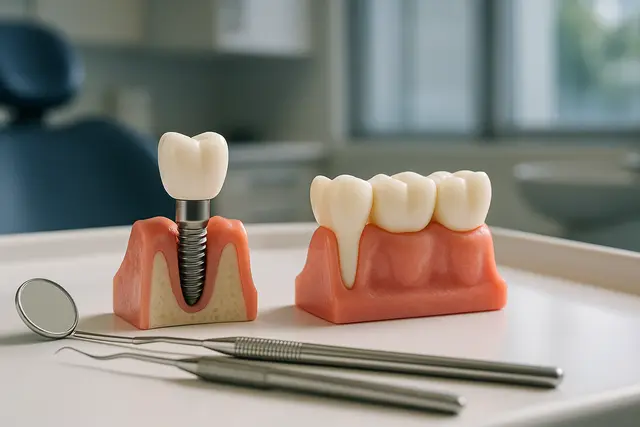Prosthodontics
5 min read
Oct 21, 2025
Mini Implants vs. Traditional Implants: How They Work and When to Choose Each
Missing teeth can impact more than just your appearance, they can affect your confidence, oral health, and ability to enjoy everyday activities like eating and speaking. Fortunately, dental implants offer a reliable solution. But when it comes to choosing between mini implants and traditional implants, the differences can be surprisingly significant.

Losing a tooth is never fun. Whether it’s from an accident, decay, or one too many popcorn kernels, the gap left behind can mess with your confidence, your bite, and even your overall oral health. Luckily, dental implant technology has come a long way. If you're trying to figure out the best solution for replacing missing teeth, you've probably come across two options: the mini dental implant and the traditional implant.
Let’s clear up the confusion and talk about how both dental implants work, their pros and cons, and how to choose what’s right for your smile.
How a Dental Implant Actually Works
A dental implant is a small screw, usually made from titanium, that’s placed in your jawbone where a tooth used to be. It acts as an artificial tooth root and holds a crown, bridge, or denture in place. Think of it as the foundation of your new smile.
The implant integrates with your jawbone over time through a process called osseointegration. That’s just a fancy word for your bone bonding with the implant so it stays put, firmly, comfortably, and long-term. Once healed, it becomes the base for your final restoration, whether that’s a single tooth or a full row of artificial teeth.
Dental implants are often recommended because they:
Improve oral health
Don’t rely on nearby teeth for support like bridges do
What Makes a Mini Dental Implant Different
Here’s where things get interesting. A mini dental implant is just like the regular kind, but smaller in diameter. Typically less than 3mm, mini implants are often used when there isn’t enough jawbone density to support traditional implants or when a less invasive approach is preferred.
Mini implants are commonly used to support dentures or replace a single tooth in tight spaces. The mini dental implant procedure is faster, usually requires no stitches, and the healing time is shorter. If you hate the idea of a long recovery or multiple dental visits, the smaller size of mini implants means you’re likely looking at a quicker recovery and less fuss.
Implants vs. the Old Tooth Replacement Standbys
If you've been living with dentures or considering a bridge, you might be wondering where implants fit in. Here’s the deal. Dentures can slip, click, or feel uncomfortable. Bridges require grinding down nearby natural teeth. A dental implant skips both issues by anchoring directly into the jawbone like a natural tooth root.
When it comes to mini dental implants vs traditional dental implants, both are stronger and longer-lasting than removable options. And mini implants can be a solid alternative to traditional for people with lower bone density or those looking for a simpler, less invasive procedure.
When to Choose a Mini Dental Implant
Mini implants are smaller in diameter, so they don’t need as much jawbone density to be placed. This makes them ideal for patients who have experienced some bone loss or aren’t interested in getting a bone graft. If your bone isn’t thick enough for a regular implant, mini implants may be a good option.
Because the procedure is less invasive, it’s often more comfortable, with fewer complications and a quicker recovery. That’s a big win if you’re not into the whole “multiple-surgery” experience. Mini implants are often used to support dentures, especially for patients who want more stability but don’t want to commit to conventional implants.
When a Traditional Implant is the Better Fit
That said, traditional dental implants are still the gold standard for many cases. They’re perfect for single tooth replacement or when long-term durability is key. If you’re missing a front tooth or need a strong anchor for chewing pressure, a regular implant is usually the better bet.
They also tend to offer better support for larger restorations like bridges. While the procedure may be more involved, the payoff is worth it for many patients.
The Importance of a Consultation
Every mouth is different. You’ve got unique bone density, gum health, and bite alignment, all of which play a part in deciding the best type of implant for you.
That’s why a consultation with a qualified dentist is crucial. They’ll evaluate whether you’re a good candidate for either type of dental implant and help guide you through the pros and cons. Imaging may be used to check your jawbone density to support implants, and your overall oral health will be taken into account.
What You Should Know About the Cost of Mini Dental Implants
Let’s talk numbers. The cost of mini dental implants is typically lower than regular dental implants, making them an attractive option for budget-conscious patients. Fewer materials, less time in the chair, and no need for a bone graft often mean a more affordable price tag.
The average cost of mini dental implants varies depending on how many you need, your location, and the complexity of the case, but they usually come in at less than traditional implants.
Benefits of Mini Dental Implants Beyond Just Price
Affordability is great, but it’s not the only reason mini implants shine. They often require only one dental visit for placement, and many patients report less discomfort post-op. Plus, the smaller size of mini implants makes them a great fit for tight spots where traditional implants simply won’t work.
The benefits of mini dental implants include:
Less invasive procedure
No need for bone grafting
Quicker recovery
Immediate function in some cases
Lower cost
They’re a solid solution for replacing missing teeth when time, cost, or bone loss are factors.
Understanding the Implant Procedure
The implant procedure differs depending on the type of implant. For traditional implants, the process often includes tooth extraction (if necessary), bone grafting, implant placement, healing, and then the crown.
With mini implants, the process skips a few of those steps. The smaller size allows for a simpler procedure, usually with local anesthesia, and often the crown or denture can be placed right away.
How Long Do Dental Implants Last
Here’s the good news: dental implants can last for many years, often decades, when cared for properly. That means regular dental checkups, good oral hygiene, and avoiding habits like smoking that can lead to implant failure.
While mini implants are less robust due to their size, they still offer excellent longevity for the right cases. With proper care, both mini and traditional implants can give you a stable, natural-looking smile for a very long time.
Choosing the Right Type of Implant
So, which type of implant should you choose? It all comes down to your individual needs, preferences, and the recommendation of your dental professional. The type of implant you go with should fit your jaw, your smile goals, and your lifestyle.
Mini implants and traditional implants each have their place, and thanks to modern technology, both can restore your smile with results that feel just like the real deal.
What Is the Difference Between Mini Implants and Traditional Implants?
The main difference lies in their size and application. Mini implants are smaller in diameter (usually under 3mm) and are often used in cases with limited jawbone or to stabilize dentures. Traditional implants are larger and stronger, making them ideal for replacing single teeth or supporting bridges. Mini implants involve a less invasive procedure and shorter healing time, while traditional implants typically offer greater long-term durability and support.
When Should You Consider Mini Dental Implants?
Mini dental implants are a great choice if you have limited bone density, want to avoid bone grafting, or are looking for a quicker, more affordable option. They’re often used to stabilize loose dentures or replace small teeth in tight spaces. The procedure is less invasive, with shorter recovery, making it appealing for those who prefer minimal downtime.
Why Choose Traditional Implants Over Mini Implants?
Traditional implants are better suited for patients seeking maximum durability and strength, especially in areas that endure heavy chewing pressure, like molars. They’re ideal for single-tooth replacements or supporting larger restorations. Though the process takes longer and may involve bone grafting, traditional implants offer unmatched stability and longevity when placed in suitable candidates.
Are Mini Implants More Affordable Than Traditional Ones?
Yes, mini implants are typically more budget-friendly than traditional implants. They require fewer materials, less surgical time, and often skip the need for bone grafts. This reduces both the cost and the number of visits needed. While traditional implants have higher upfront costs, they may offer better long-term value depending on your oral health and needs.
Read Next
Related Posts

Prosthodontics
How to Choose Between Dentures and Implants for Tooth Replacement
Losing teeth can be a tough experience, physically, emotionally, and socially. Fortunately, modern dentistry offers reliable solutions to restore both function and confidence. Among the most popular options are dentures and dental implants, each with its own advantages depending on your needs, health, and lifestyle.
6 min read
Oct 21, 2025

Prosthodontics
Single Tooth Implant vs. Bridge: Pros and Cons
Missing a tooth can feel overwhelming, but you're not alone. Whether it’s from an injury, decay, or an unexpected mishap, choosing the right way to replace it is a big decision. Two of the most common options are dental implants and bridges, each with its own benefits and trade-offs. Understanding the differences can help you make a confident, informed choice for your smile and long-term oral health.
5 min read
Oct 21, 2025

Prosthodontics
Tooth Implant vs. Denture: Cost Effectiveness
Choosing between dental implants and dentures isn’t just a financial decision, it’s about finding the right fit for your lifestyle, oral health, and long-term comfort. While both options aim to restore your smile and function, they differ significantly in durability, cost, and impact on your overall well-being.
4 min read
Oct 21, 2025
Don’t have time to research every dentist around you?
See why 30k+ patients trusted us